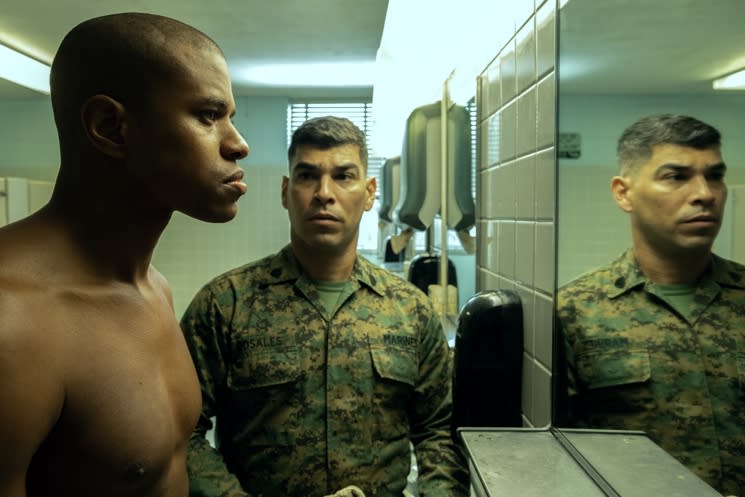As far as army bootcamp movies go, Elegance Bratton's directorial debut, The Inspection, follows the similar threads of many beloved films of a similar ilk: the angry drill sergeant is mean and bullies his recruits who, in turn, break down but ultimately persevere with a newfound self-acceptance and/or confidence. Ellis French (Jeremy Pope) offers us a different lens through which to see this familiar story, as he encounters the effects of the "don't ask, don't tell" policy of the 1990s and early 2000s.
Based on Bratton's own experience in the army, The Inspection is primarily set during bootcamp, where French and his fellow recruits are berated until boiling point. After an unfortunate moment of mind-wandering sexual fantasy while showering, French outs himself to the group, which results in persistent discrimination and abuse from the other soldiers and his commanding officers.
While French's experience is the main focus, Bratton creates space to acknowledge the bigotry faced by Muslims enlisting in the army post-9/11 through Ismail (Eman Esfandi). Bratton connects French and Ismail's experiences as "others," conveying a strong message about the treatment of recruits who don't fit the typical mould traditionally preferred by the Armed Forces.
The film is bookended by French's relationship with his mom, Inez (Gabrielle Union), who had kicked him out of the house for being gay when he was just 16 years old. Inez's religious beliefs keep her from "loving what he is," despite her undeniable love for her son. Union absolutely smashes this small but crucial role. An actress not often lauded, Union shows a range that we haven't seen from her before, delivering an absorbing performance deserving of the awards consideration given so far.
As for Pope, he brings his theatre charm and showmanship to French. He doesn't simply elicit sympathy from audiences for the hardship he's faced with; Pope actively creates a likeable young man that we want to see succeed regardless of the adversity he faces.
Given the heavy subject matter and a few scenes of an explicit sexual nature, it may seem odd to characterize The Inspection as "Disneyfied." Perhaps because we've seen this story many times, albeit not usually within the context of a gay Black man, there's a relative tameness and almost vanilla coating to the film. However, in going down this route, Bratton has created a film far more accessible than one with a much darker tone would have, opening up the important topics explored in the film to a wider breadth of people.
The film shows us the worst parts of the Marines as an institution: the bigotry, homophobia and rampant misogyny encouraged throughout most of the film paints the military in an outdated colour. So then, it feels somewhat contradictory when the final moments of the film asks us to find joy and comfort in the very same system.
But maybe this is all intentional. Retrospective filmmaking often invites a complicated narrative as memories contort over time. For Bratton, the imbalance in the film may reflect the personal conflict he has with this chapter of his life: it led him on a path to become a confident and successful artist, but at what cost to his humanity?
(levelFILM)Based on Bratton's own experience in the army, The Inspection is primarily set during bootcamp, where French and his fellow recruits are berated until boiling point. After an unfortunate moment of mind-wandering sexual fantasy while showering, French outs himself to the group, which results in persistent discrimination and abuse from the other soldiers and his commanding officers.
While French's experience is the main focus, Bratton creates space to acknowledge the bigotry faced by Muslims enlisting in the army post-9/11 through Ismail (Eman Esfandi). Bratton connects French and Ismail's experiences as "others," conveying a strong message about the treatment of recruits who don't fit the typical mould traditionally preferred by the Armed Forces.
The film is bookended by French's relationship with his mom, Inez (Gabrielle Union), who had kicked him out of the house for being gay when he was just 16 years old. Inez's religious beliefs keep her from "loving what he is," despite her undeniable love for her son. Union absolutely smashes this small but crucial role. An actress not often lauded, Union shows a range that we haven't seen from her before, delivering an absorbing performance deserving of the awards consideration given so far.
As for Pope, he brings his theatre charm and showmanship to French. He doesn't simply elicit sympathy from audiences for the hardship he's faced with; Pope actively creates a likeable young man that we want to see succeed regardless of the adversity he faces.
Given the heavy subject matter and a few scenes of an explicit sexual nature, it may seem odd to characterize The Inspection as "Disneyfied." Perhaps because we've seen this story many times, albeit not usually within the context of a gay Black man, there's a relative tameness and almost vanilla coating to the film. However, in going down this route, Bratton has created a film far more accessible than one with a much darker tone would have, opening up the important topics explored in the film to a wider breadth of people.
The film shows us the worst parts of the Marines as an institution: the bigotry, homophobia and rampant misogyny encouraged throughout most of the film paints the military in an outdated colour. So then, it feels somewhat contradictory when the final moments of the film asks us to find joy and comfort in the very same system.
But maybe this is all intentional. Retrospective filmmaking often invites a complicated narrative as memories contort over time. For Bratton, the imbalance in the film may reflect the personal conflict he has with this chapter of his life: it led him on a path to become a confident and successful artist, but at what cost to his humanity?
